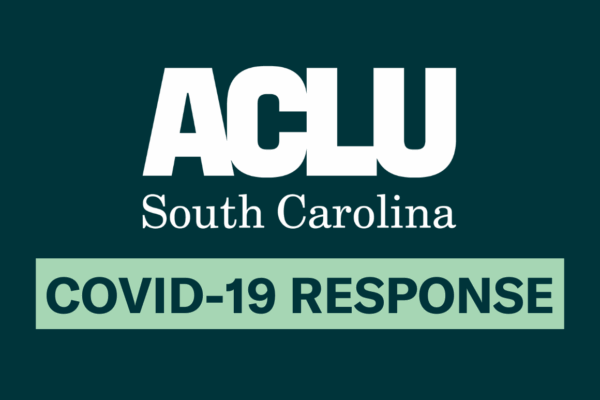People involved in the criminal legal system face heightened risk of COVID-19 infection. We urge South Carolina prison and jail officials to immediately develop evidence-based and proactive plans for the prevention and management of COVID-19 in their facilities.
Incarcerated people are highly vulnerable to outbreaks of contagious illnesses. They are housed in close quarters and are often in poor health. Without the active engagement of prison and jail administrations, they have little ability to inform themselves about preventive measures, or to take such measures if they do manage to learn of them.
We call on leaders to immediately reach out to the South Carolina Department of Health and Environmental Control (DHEC) to develop plans to address the virus in jails and prisons. This is an urgent matter. Having an appropriate, evidence-based plan in place can help prevent an outbreak and minimize its impact if one does occur. Not having one may cost lives.
While the plan should be developed in collaboration with public health experts and DHEC, some of the critical issues that must be addressed are:
* Education of the people in custody: Incarcerated people need to be informed about the virus and the measures they can take to minimize their risk of contracting or spreading the virus. They must be educated on the importance of proper hand washing, coughing into their elbows, and social distancing to the extent they can. Information about the spread of the virus, the risks associated with it, and prevention and treatment measures must be based on the best available science.
* Education of the staff: Correctional, administrative, and medical staff all must be educated about the virus to protect themselves and their families, as well as the people in their custody.
* Staffing plans: Regardless of how many staff stay home because they are sick, prisons and jails will have to continue functioning. There must be a plan for how necessary functions and services will continue if large numbers of staff are out with the virus.
* Staffing plans for services provided by incarcerated people: Many tasks in prisons, such as food preparation and basic sanitation, are performed by incarcerated people. The plans for an outbreak must also address how necessary tasks performed by incarcerated people will continue if large numbers are ill.
* Provision of hygiene supplies: The most basic aspect of infection control is hygiene. There must be ready access to warm water and adequate hygiene supplies, both for hand washing and for cleaning.
* Screening and testing of the people in your custody: The plan must include guidance, based on the best science available, on how and when to screen and test people in your facilities for the virus.
* Housing of persons exposed to the virus: The plan must describe how and where people will be housed if they are exposed to the virus, are at high risk of serious illness if they become infected, or become sick with it. This should not result in prolonged, widespread lock-downs. Any lock-downs or interruptions in regular activities, such as exercise or visits and phone calls with families or attorneys, should be based solely on the best science available and should be as limited as possible in scope and duration.
* Treatment: Courses of treatment must be evidence-based, available immediately, and in compliance with scientifically based public health protocols.
* Vulnerable Populations: The plan must provide for additional precautions for those who are at high risk of serious illness if they are infected, such as pregnant women and people with chronic illnesses, compromised immune systems, or disabilities, and people whose housing placements restrict their access to medical care and limit the staff’s ability to observe them.
* Data collection: The collection of data regarding COVID-19 will be part of the public health response. As with any contagious disease, data collection is critical to understanding and fighting the virus. Prisons and jails must be part of this process and track the same information that is tracked in the broader community.



